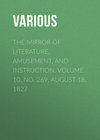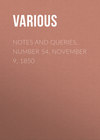Loe raamatut: «The Mirror of Literature, Amusement, and Instruction. Volume 10, No. 269, August 18, 1827», lehekülg 4
ANCIENT POWDER FLASK

(To the Editor of the Mirror.)
SIR,—The enclosed curious drawing of an ancient powder "flaske," both in form and ornament, may not be uninteresting to the readers of your valuable MIRROR at the approaching sporting season.
Gunpowder, when first invented, was carried in the horns of animals, for safety and convenience; though some time afterwards placed in flat leather cases or bottles, invented by the Germans, and called "flaskes." A remarkably curious one of this description, evidently of the time of Queen Elizabeth, is here represented, and is formed of ivory, somewhat in the shape of a stag's horn; the ornaments on it are carved in a good bold style, and represent an armed figure on horseback in full chase. The "flaske" is tipped at the end with silver, and measures about eight inches in length.
I remain, yours,
* *
SPIRIT OF THE PUBLIC JOURNALS
CHARACTER OF THE SEPOYS
Our countrymen at home are frequently perplexed by the apparent contradictions of a traveller from the East, when describing the characters and manners of the inhabitants of Hindostan. If, for instance, he alludes to our gallant sepoys, he pours forth unmeasured praise, and appears altogether charmed with their docility, courage, honour, and fidelity. On the other hand, his opinion of the natives in the aggregate is often as exactly the reverse as it is possible to imagine. They are described, perhaps, in the strongest terms, as at once servile, cowardly, treacherous, and ungrateful. The fact is, that our troops are all from the northern provinces of India, the natives of which are a brave and generous race, who hold the profession of arms in the highest estimation. The Bengallees on the contrary, (with the most universal and shameless indifference to truth,) are mean, effeminate, and avaricious. They are chiefly composed of merchants, copying clerks, mechanics, and domestic servants, and are invariably refused admittance into the company's army. These people are vastly inferior to the natives of the upper provinces in mental and corporeal energy, though more polished in their manners, and more easily initiated into the arts and mysteries of civilized life. I will illustrate the nice sense of honour which distinguishes the native soldier by the following anecdote.
A sepoy of the Bengal native infantry was accused by one of his comrades of having stolen a rupee and a pair of trousers. The sergeant-major before whom, in the first instance, the charge was brought, was both unable and unwilling to give it credence. Besides the unusual circumstance of a native soldier being guilty of so base an act, the accused sepoy had always been remarkably conspicuous for his brave and upright conduct. His breast was literally covered with medals, and he had long been accustomed to the voice of praise. Still, however, justice demanded that the charge should not be dismissed without an impartial investigation. The whole affair was brought to the notice of the commanding officer, who desired that the sepoy's residence should be immediately and thoroughly examined. On opening his knapsack, to the utter astonishment and regret of the whole regiment, the stolen property was discovered. None, however, looked more thunderstruck than the sepoy himself. He clenched his teeth in bitter agony, but spoke not a single word. The colonel told him, that though circumstances were fearfully against him, he would not yet pronounce him guilty, as it was not impossible he might be the victim of some malignant design. He therefore dismissed him from his presence until the result of further inquiries should produce a full conviction of his guilt or innocence. In a few hours the sepoy was observed to leave his little hut, and walk with hurried steps to a neighbouring field. He was soon concealed from sight by a thick cluster of bamboos, beneath which he had often sheltered himself from the noontide sun. Suspecting the purpose of his present visit to so retired a spot, a comrade followed him, but was unfortunately too late to arrest the hand of the determined suicide. The poor fellow lay stretched on the ground, with his head hanging back, and the blood gushing from his open throat. He had effected his purpose with a sharp knife, which he still grasped, as if with the intention of inflicting another wound. He was carried to the hospital, and carefully attended, but the surgeon immediately pronounced his recovery impossible. A pen and ink were brought to him, and he wrote with some difficulty on a slip of paper, that he firmly hoped he had not failed in his attempt to destroy himself, for life was of no value without honour. He stated, too, that though it might now be almost useless to affirm his innocence, he hoped that a time might come when his memory should be freed from its present stain. He lingered no less than fifteen days in this dreadful state, and died, at last, apparently of mere starvation. It was my painful duty, as "officer of the day," to visit the hospital very frequently, and he invariably made signs of a desire for food. This it was, of course, impossible to give him, and any nourishment would merely have prolonged his misery. Two days before he died, it was discovered that a Bengallee servant of low caste, who had taken offence on some trivial occasion, had placed the stolen goods in the sepoy's bundle, and then urged the owner to accuse him of the theft. The disclosure of this circumstance appeared to give infinite satisfaction to the dying soldier.
London Weekly Review.
HOUSE LAUNCHING
The launching of the two brick houses in Garden-street was completely successful. They were moved nearly ten feet, occupied at the time by their tenants, without having sustained any injury. The preparations were the work of some time; the two buildings having been put upon ways, or into a cradle, were easily screwed on a new foundation. The inventor of this simple and cheap mode of moving tenanted brick buildings, is entitled to the thanks of the public. In the course of time, it is likely that houses will be put up upon ways at brick or stone quarries, and sold as ships are, to be delivered in any part of the city.—American Paper.
In the course of time we really do not know what is not to happen in America. Jonathan promises to grow so big, and to do such wonders in a day or two, that no bounds can be placed to his performances in the future tense. Everything will of course be on a scale of grandeur proportioned to his country, which, as he observes in his Travels in England, is "bigger and more like a world" than our boasted land; instead, therefore, of going about in confined, close carriages as people do here, the Americans will rattle through the streets to their routs and parties in their houses. One tenanted brick building will be driven up to the door of another. A further improvement may here be suggested. Jonathan is fond of chairs with rockers, that is, chairs with a cradle-bottom, on which he see-saws himself as he smokes his pipe and fuddles his sublime faculties with liquor. Now by putting a house on rockers, this trouble and exertion of the individual on a scale so small and unworthy of a great people would be spared, and every tenant of a brick building would be rocked at the same time, and by one common piece of machinery. The effect of a whole city nid-nid-nodding after dinner, will be extremely magnificent and worthy of America. As for the feasibility of the thing, nothing can be more obvious. If houses can be put upon cradles for launching, they can be put upon cradles for rocking; and if tenants do not object to being conveyed from one part of the city to another in their mansions, they will not surely take fright at an agreeable stationary see-saw in them.—London Magazine.
GOOD NIGHT TO THE SEASON
Thus runs the world away.—HAMLET.
Good-night to the Season! 'tis over!
Gay dwellings no longer are gay;
The courtier, the gambler, the lover,
Are scatter'd, like swallows, away:
There's nobody left to invite one,
Except my good uncle and spouse;
My mistress is bathing at Brighton,
My patron is sailing at Cowes:
For want of a better employment,
Till Ponto and Don can get out,
I'll cultivate rural enjoyment,
And angle immensely for trout.
Good-night to the Season!—the buildings
Enough to make Inigo sick;
The paintings, and plasterings, and gildings,
Of stucco, and marble, and brick;
The orders deliciously blended,
From love of effect, into one;
The club-houses only intended,
The palaces only begun;
The hell where the fiend, in his glory,
Sits staring at putty and stones,
And scrambles from story to story,
To rattle at midnight his bones.
Good-night to the Season!—the dances,
The fillings of hot little rooms,
The glancings of rapturous glances,
The fancyings of fancy costumes;
The pleasures which Fashion makes duties,
The praisings of fiddles and flutes,
The luxury of looking at beauties,
The tedium of talking to mutes;
The female diplomatists, planners
Of matches for Laura and Jane,
The ice of her Ladyship's manners,
The ice of his Lordship's champagne.
Good-night to the Season!—the rages
Led off by the chiefs of the throng,
The Lady Matilda's new pages,
The Lady Eliza's new song;
Miss Fennel's Macaw, which at Boodle's
Is held to have something to say;
Mrs. Splenetic's musical Poodles,
Which bark "Batti, batti!" all day:
The pony Sir Araby sported,
As hot and as black as a coal,
And the Lion his mother imported,
In bearskins and grease, from the Pole.
Good-night to the Season!—the Toso,
So very majestic and tall;
Miss Ayton, whose singing was so so,
And Pasta, divinest of all;
The labour in vain of the Ballet,
So sadly deficient in stars;
The foreigners thronging the Alley,
Exhaling the breath of cigars;
The "loge," where some heiress, how killing,
Environ'd with Exquisites sits,
The lovely one out of her drilling,
The silly ones out of their wits.
Good-night to the Season!—the splendour
That beam'd in the Spanish Bazaar,
Where I purchased—my heart was so tender—
A card-case,—a pasteboard guitar,—
A bottle of perfume,—a girdle,—
A lithograph'd Riego full-grown,
Whom Bigotry drew on a hurdle,
That artists might draw him on stone,—
A small panorama of Seville,—
A trap for demolishing flies,—
A caricature of the Devil,
And a look from Miss Sheridan's eyes.
Good-night to the Season!—the flowers
Of the grand horticultural fête,
When boudoirs were quitted for bowers,
And the fashion was not to be late;
When all who had money and leisure,
Grow rural o'er ices and wines,
All pleasantly toiling for pleasure,
All hungrily pining for pines,
And making of beautiful speeches,
And marring of beautiful shows,
And feeding on delicate peaches,
And treading on delicate toes.
Good night to the Season!—another
Will come with its trifles and toys,
And hurry away, like its brother,
In sunshine, and odour, and noise.
Will it come with a rose or a briar?
Will it come with a blessing or curse?
Will its bonnets be lower or higher?
Will its morals be better or worse?
Will it find me grown thinner or fatter,
Or fonder of wrong or of right.
Or married, or buried?—no matter,
Good-night to the season, Good-night!
New Monthly Magazine.
TIGER TAMING
A party of gentlemen from Bombay, one day visiting the stupendous cavern temple of Elephanta, discovered a tiger's whelp in one of the obscure recesses of the edifice. Desirous of kidnapping the cub, without encountering the fury of its dam, they took it up hastily and cautiously, and retreated. Being left entirely at liberty, and extremely well fed, the tiger grew rapidly, appeared tame and fondling as a dog, and in every respect entirely domesticated. At length, when it had attained a vast size, and notwithstanding its apparent gentleness, began to inspire terror by its tremendous powers of doing mischief, a piece of raw meat, dripping with blood, fell in its way. It is to be observed, that, up to that moment, it had been studiously kept from raw animal food. The instant, however, it had dipped its tongue in blood, something like madness seemed to have seized upon the animal; a destructive principle, hitherto dormant, was awakened—it darted fiercely, and with glaring eyes, upon its prey—tore it with fury to pieces—and, growling and roaring in the most fearful manner, rushed off towards the jungles.—London Weekly Review.
RUNNING A MUCK
The inhabitants of the Indian Archipelago, and particularly of the island of Java, are of a very sullen and revengeful disposition. When they consider themselves grossly insulted, they are observed to become suddenly thoughtful; they squat down upon the ground, and appear absorbed in meditation. While in this position, they revolve in their breasts the most bloody and ferocious projects of revenge, and, by a desperate effort, reconcile themselves with death. When their terrible resolution is taken, their eyes appear to flash fire, their countenance assumes an expression of preternatural fury; and springing suddenly on their feet, they unsheath their daggers, plunge them into the heart of every one within their reach, and rushing out into the streets, deal wounds and murder as they run, until the arrow or dagger of some bold individual terminates their career. This is called running a muck.—Ibid.




















